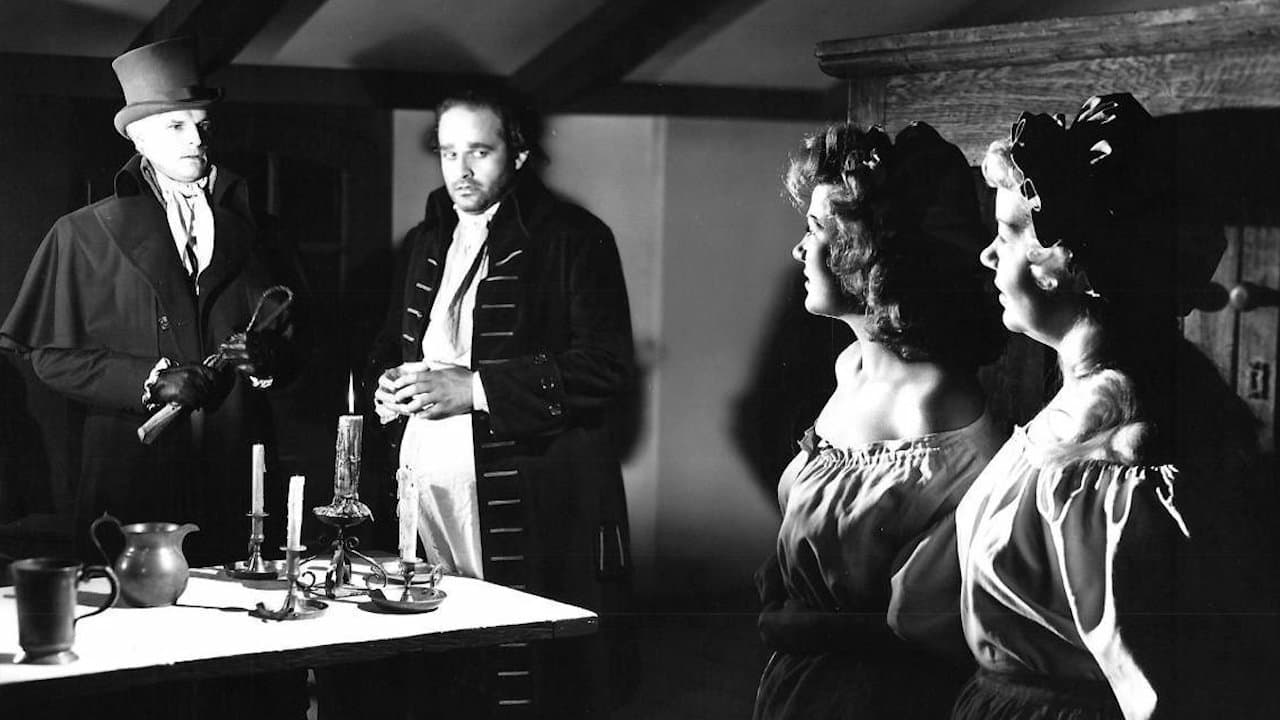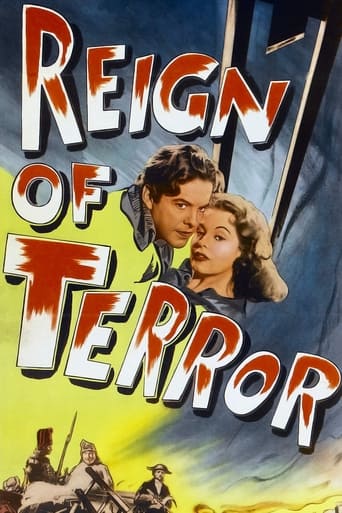Interesteg
What makes it different from others?
Inadvands
Boring, over-political, tech fuzed mess
InformationRap
This is one of the few movies I've ever seen where the whole audience broke into spontaneous, loud applause a third of the way in.
Jenna Walter
The film may be flawed, but its message is not.
Robert J. Maxwell
A story of intrigue and, finally, some action during the Reign of Terror. The Reign of Terror followed the French revolution. The usual narrative looks something like this.The King in his counting house was a lazy lout. So were his buddies and his various mistresses. (If the people have no bread, "Let them eat cake.") But the people of France rose up in their righteous wrath, overthrew the King, and in 1793 lopped off his head at the central square in Paris known ironically as the Place de la Concorde. Then, as often happens in the aftermath of revolutions, the revolutionaries went ape.Others who met Madame Guillotin at the same spot, often to cheering crowds, included Queen Marie Antoinette, Princess Élisabeth of France, Charlotte Corday, Madame du Barry, Georges Danton, Camille Desmoulins, Antoine Lavoisier (yes, "the father of modern chemistry"), Maximilien Robespierre, Louis de Saint-Just and Olympe de Gouges. Lavoisier was the chemist who discovered oxygen and hydrogen. He was convicted by the revolutionary court of selling adulterated tobacco. I think their barbers and shoe shine boys met the same fate. Fidel Castro worked his way down to mailmen.As far as I can tell, this is a fictional story of Robert Cummings posing as an imported German executioner and detective working for the evil Richard Basehart as Robespierre, the chief rebel, who wanted to become dictator. I really don't know much about these shenanigans because while everyone else was taking French Civilization, I was taking German Civilization. They got Napoleon and a pastry; I got Bismark and a herring. Everybody knows Victor Hugo but they'd think the novelist Kleist was a Chinese Messiah.Arlene Dahl is stunning and dull. Richard Basehart is fine as the arid and ambitious Robespierre but he's trapped in his dark clothes and powdered wig. Robert Cummings is not the kind of guy you'd expect in a role like this. The director, Anthony Mann, and photographer, Alton, have filled the screen with stark shadows and ominous entries and exits. I never thought of Cummings a wooden -- he's good at light comedy -- but he spends much of his time here looking down his nose and sneering. I guess that's his idea of what a fake executioner should look like.In a way, this could easily be a Cold War movie (1949) with the evil USSR trying to dominate the world and executing all its enemies. Gospoda instead of Citoyen. With Josef Stalin in charge, it wouldn't have been too far from the truth. Or -- it could have been an anti-Nazi spy movie from the war years. Or -- with a bit of tweaking -- Robespierre could have been turned into Mister Big in a 30s gangster movie. What I mean is that there isn't much nuance on display, just good versus evil.It livens up considerably as the story unfolds. Carriages chase one another; the pursued pair hide in the hayloft; long hot pursuits on hot horses; Charles McGraw at his least kempt; the MacGuffin is a black book that is stolen from the wrong hands but may be recaptured. Some Corsican soldier named Bonaparte makes an appearance at the end.That Corsican shows up for good reason. A mob can't control itself. As Judge Learned Hand put it: "A society in which men recognize no check on their freedom soon becomes a society where freedom is the possession of only a savage few."
Chris-Berlin
Unfortunately a good Copy, good picture quality on DVD is not available in the moment as far as I know.Who could please help me to get one? Maybe the film was shown on TV once in a good quality and someone recorded it? :-) Please email me. Thanks.Best Regards :-)Unfortunately a good Copy, good picture quality on DVD is not available in the moment as far as I know.Who could please help me to get one? Maybe the film was shown on TV once in a good quality and someone recorded it? :-) Please email me. Thanks. Best Regards :-) (I had to repeat due to be forced to fill 10 lines) *smile*
Neil Doyle
ROBERT CUMMINGS and ARLENE DAHL are improbably cast in a grim tale of the French Revolution during the famous reign of terror following the storming of the Bastille. RICHARD BASEHART plays the treacherous keeper of "The Black Book", Robspierre, seen in powdered wig, a man with a twisted mind and soul, who declares that "the Revolution has abolished God." JESS BARKER is an equally treacherous henchman, a soldier of the Republic assigned to find the man who stole the infamous book listing the names of the enemies of France.The low-key B&W photography hides most of the sets in deep shadows, giving the impression that it covers the low-budget production values and at the same time gives the story a film noir ambiance.Cummings and Barker, usually cast in more lightweight material, are fine in some sketchily written roles and Dahl is her usual attractive self, little more, as a woman of mystery.RUSS TAMBLYN has a minor early role and BEULAH BONDI has a small part as a woman who knows the whereabouts of the Black Book.It ends, of course, with the downfall of the evil Robspierre and his cohorts.Summing up: Fairly interesting, but Arlene Dahl's make-up and hairdo is strictly from a modern era. She never quite fits the mold of a period costume heroine, more like an anachronism in an otherwise convincing French Revolution setting.
MartinHafer
The film is about a little black book that is in Citizen Robespierre's possession. This leader during the so-called "Reign of Terror" was a cold fish who consigned many--including his good friend, Danton, to the guillotine all in the name of patriotism. It seems in this movie that the Citizen actually has a master plan to wipe out everyone around him--it's hidden in this book and it is important to find the book and reveal to everyone the evil hit list. It's up to secret agent Bob Cummings to find it and convince everyone of the danger the nation faces.There have been some exceptional films about the French Reign of Terror (in the 1790s), such as THE SCARLET PIMPERNEL, A TALE OF TWO CITIES and DANTON. Because these films were so good, it made it much tougher to watch and enjoy REIGN OF TERROR. Sure, it was a good film, but compared to these great films it pales in comparison. Much of it is because there really isn't much in the way of character development and the actors could have just as likely been in a movie set in an entirely different time period. Overall, it's pretty much just a time-passer and an actor I usually love in films (Richard Basehart) is pretty bland as is the lead, Bob Cummings.

